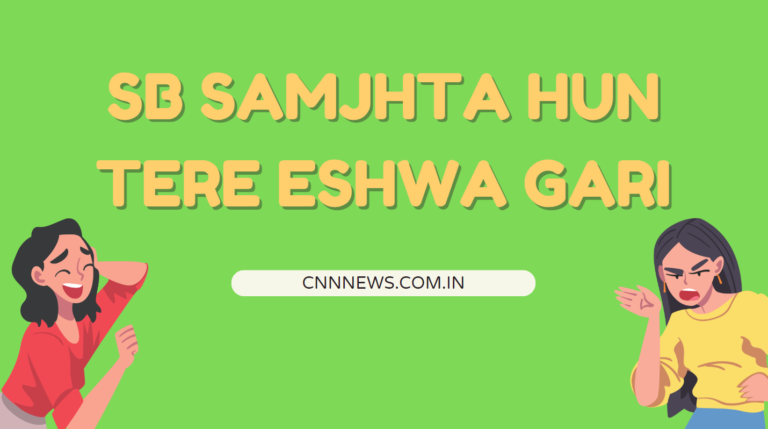Language is more than just a way to communicate—it’s a vessel for culture, emotion, and shared experiences. A phrase like “sb samjhta hun tere eshwa gari” carries layers of meaning that reflect deep emotional states and experiences that many of us can relate to. But what does it really mean? And why does it resonate with so many?
In this article, we’ll explore this phrase and uncover the feelings, context, and implications behind it. Whether you’ve heard it before or are encountering it for the first time, this guide will help you appreciate its depth and significance.
Table of Contents
Introduction to “Sb Samjhta Hun Tere Eshwa Gari”
The phrase “sb samjhta hun tere eshwa gari“ evokes a feeling of understanding mixed with subtle emotion. In English, it loosely translates to “I understand everything about your gestures,” but there’s more beneath the surface. It’s a phrase often used to express empathy, connection, and sometimes disappointment or frustration when someone’s unspoken actions reveal their true feelings.
Breaking Down the Phrase
Let’s take a closer look at each part of this phrase:
- “Sb samjhta hun”: This translates to “I understand everything,” indicating a sense of awareness or comprehension beyond just words.
- “Tere”: Meaning “your,” it adds a personal element, suggesting that the speaker is directly addressing someone close to them.
- “Eshwa gari”: This is the key part of the phrase. “Eshwa” refers to gestures or actions, and “gari” connects it to the idea of driving or guiding one’s actions.
Together, it forms a deeper meaning: the speaker understands not only the words but also the unspoken actions and emotions of the other person.
Cultural Significance of the Phrase
In many cultures, especially those rich in poetry and emotional expression, gestures and actions are often as important as words. “Sb samjhta hun tere eshwa gari” taps into that tradition. It expresses a silent understanding, where actions speak louder than words. Think of it like reading between the lines or picking up on the subtle cues that others might miss.
In South Asian cultures, where non-verbal communication can carry significant weight, this phrase finds a special place in both romantic and platonic relationships. It’s not just about what someone says, but what they do—and what they leave unsaid.
Why Does It Resonate?
Why does this phrase strike such a chord with people? It’s because it taps into a universal feeling of recognition and emotional awareness. We’ve all experienced moments where someone’s actions reveal more than their words, and the phrase captures that perfectly. It’s about understanding without explanation—about picking up on emotional undercurrents that are often left unspoken.
Have you ever felt like you know what someone’s thinking just by their gestures or behavior? That’s exactly what this phrase conveys.
Emotional Layers Behind the Words
The emotional depth of “sb samjhta hun tere eshwa gari” lies in its ability to convey empathy, disappointment, or even frustration. It can be used in contexts where someone feels let down by another person’s actions, even if those actions weren’t directly stated. It’s like saying, “I understand what you’re really saying through your actions, even if you’re not using words.”
It’s both a statement of emotional intelligence and a way of calling someone out on their behavior.
How the Phrase Is Used in Everyday Life
You might hear “sb samjhta hun tere eshwa gari” in casual conversation, particularly when someone is feeling emotionally perceptive. For example, someone might say it when they’re disappointed by a friend’s lack of support, even though the friend hasn’t openly admitted to their indifference.
It’s used to indicate that the speaker is fully aware of the other person’s hidden intentions or unspoken thoughts.
Impact on Personal Relationships
When used in personal relationships, this phrase often serves as a way to highlight the importance of actions over words. It’s frequently heard in situations of romantic misunderstanding or in moments where a close friend or partner’s behavior has been noticed and understood, even if they haven’t said anything directly.
By saying “sb samjhta hun tere eshwa gari”, you’re letting the other person know that you’re paying attention—and that their gestures haven’t gone unnoticed.
Is “Sb Samjhta Hun Tere Eshwa Gari” a Common Saying?
Though it’s not a phrase you’ll hear every day, “sb samjhta hun tere eshwa gari” is deeply ingrained in cultural settings where emotional communication is valued. It’s the kind of phrase that might be used in poetry or literature, and it’s certainly something you’ll hear in intense conversations where emotions run high.
Popular Media and the Phrase
Given its emotional weight, “sb samjhta hun tere eshwa gari” has found its way into music and film. It’s a phrase that fits perfectly into songs about unrequited love or in movie scenes where the characters are silently navigating their feelings.
Conclusion: What “Sb Samjhta Hun Tere Eshwa Gari” Really Means
In the end, “sb samjhta hun tere eshwa gari” is more than just a phrase. It’s an expression of emotional awareness, empathy, and sometimes frustration. It captures the importance of paying attention to both words and actions, reminding us that what’s left unsaid can be just as powerful as what’s spoken.


[…] this article, we will explore the potential meanings and origins of “ruobingma ruo ma Oakland,” provide insights into its context, and offer […]
[…] there a hidden meaning behind ‘32.32 65 107-5’? It could be the key to unlocking specific information or solving a […]
[…] libros provide detailed translations and explanations, ensuring listeners can comprehend the rich meanings behind these […]
[…] interest or simply passes by unnoticed, sequences like this remind us of the hidden values and meanings behind everyday data. As we explore more about these numbers, they continue to teach us that meaning can […]